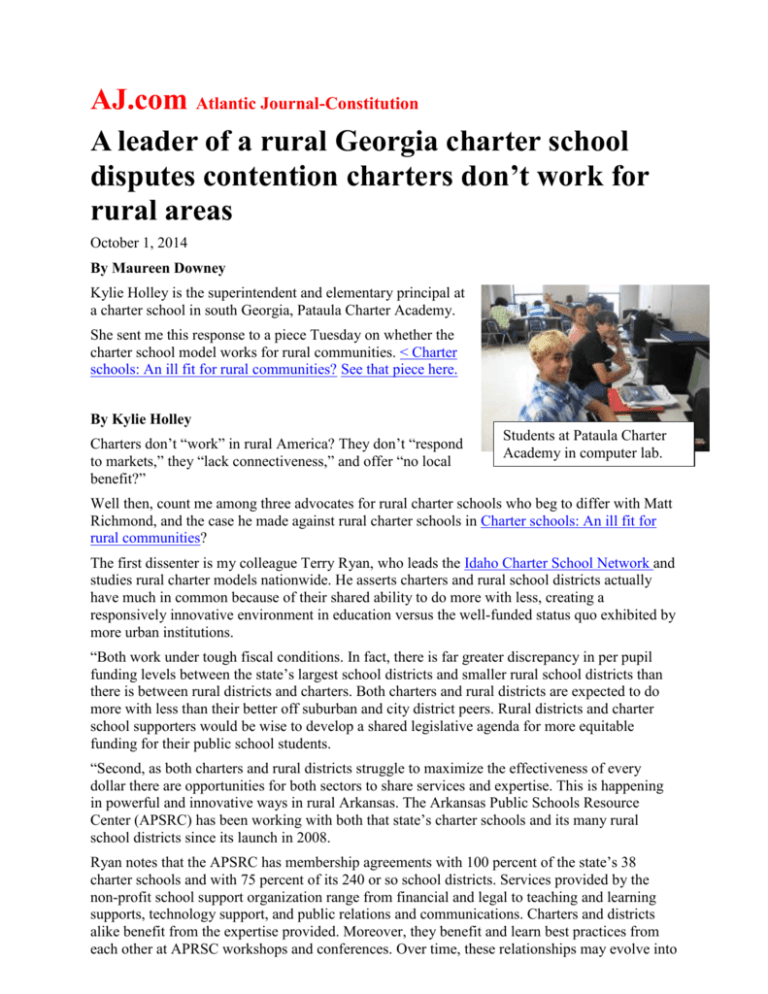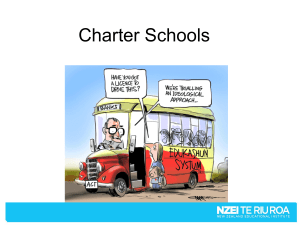Charter Schools Work in Rural Communities
advertisement

AJ.com Atlantic Journal-Constitution A leader of a rural Georgia charter school disputes contention charters don’t work for rural areas October 1, 2014 By Maureen Downey Kylie Holley is the superintendent and elementary principal at a charter school in south Georgia, Pataula Charter Academy. She sent me this response to a piece Tuesday on whether the charter school model works for rural communities. < Charter schools: An ill fit for rural communities? See that piece here. By Kylie Holley Charters don’t “work” in rural America? They don’t “respond to markets,” they “lack connectiveness,” and offer “no local benefit?” Students at Pataula Charter Academy in computer lab. Well then, count me among three advocates for rural charter schools who beg to differ with Matt Richmond, and the case he made against rural charter schools in Charter schools: An ill fit for rural communities? The first dissenter is my colleague Terry Ryan, who leads the Idaho Charter School Network and studies rural charter models nationwide. He asserts charters and rural school districts actually have much in common because of their shared ability to do more with less, creating a responsively innovative environment in education versus the well-funded status quo exhibited by more urban institutions. “Both work under tough fiscal conditions. In fact, there is far greater discrepancy in per pupil funding levels between the state’s largest school districts and smaller rural school districts than there is between rural districts and charters. Both charters and rural districts are expected to do more with less than their better off suburban and city district peers. Rural districts and charter school supporters would be wise to develop a shared legislative agenda for more equitable funding for their public school students. “Second, as both charters and rural districts struggle to maximize the effectiveness of every dollar there are opportunities for both sectors to share services and expertise. This is happening in powerful and innovative ways in rural Arkansas. The Arkansas Public Schools Resource Center (APSRC) has been working with both that state’s charter schools and its many rural school districts since its launch in 2008. Ryan notes that the APSRC has membership agreements with 100 percent of the state’s 38 charter schools and with 75 percent of its 240 or so school districts. Services provided by the non-profit school support organization range from financial and legal to teaching and learning supports, technology support, and public relations and communications. Charters and districts alike benefit from the expertise provided. Moreover, they benefit and learn best practices from each other at APRSC workshops and conferences. Over time, these relationships may evolve into institutional knowledge of what works and what does not, creating a foundation on which new charters and rural districts may build their institutions. However, the best answer to criticisms posed in Maureen Downey’s column might well originate in our own state of Georgia. As the principal of Pataula Charter Academy (PCA) in Edison, GA, I also champion the model of the rural charter school. My charter school is a Title I school enrolling students from five rural counties in southwest Georgia. PCA now has its first 10th grade class, creating a rigorous academic pathway from Kindergarten through high school. Pataula Charter Academy was created by teachers, families and community leaders in answer to plummeting high school graduation and population rates in what used to be prime Georgia cotton country. In order for our community to have a future, we had to create a stronger academic public school option and a reason for folks to stay here. Our vision, and our results, now find us “in high cotton,” academically speaking. Pataula Charter Academy’s powerful academic performance has had significant “market impact,” affording more than just an academic return on investment across all five counties. In just five years, Pataula has emerged as a major contributor to Edison’s local economy, employs 25 teachers and an equal number of support staff, and maintains an operating budget in FY2014 of $3.4 million. PCA recently purchased over 70 acres that provide space to consolidate operations on one K-12 campus and enable us to continue to be a beacon of education and innovation in the community. Over the past three years, our students outperformed their peers across Georgia in all subjects, and tested and outpaced by even larger margins students in the five counties from which Pataula draws its students. The school purchased buses to transport students and now has five buses running morning and afternoon routes. Some students travel up to 30 miles each way to attend school. So, what’s the only drawback to this success? Pataula has a waiting list in many grades. Although local feathers were ruffled when our school first opened, today we are seen as a coalition builder, not a divider. Named for the Pataula River that runs through the five counties we serve, the school now has stability and a five-year contract with Georgia’s State Charter Schools Commission. Using parent volunteers as coaches, we are building a sports program that competes with traditional public schools. One of our football coaches has no affiliation with the school, but he wanted to help out to serve kids. Finally, a leading national voice for rural charters is education policy expert Andy Smarick. Andy makes a compelling case for what charters offer rural communities. In his 2014 report, A New Frontier; Utilizing Charter Schooling to Strengthen Rural Education, concluding that the flexibility of charters can help rural areas that struggle to recruit and retain highly effective educators. “The accountability-autonomy bargain of charter schooling offers new opportunities to solve this problem. Policies should provide charter schools with additional flexibility related to teacher and administrator credentialing—either through school-wide waivers from certification requirements or flexible but rigorous alternative routes to certification.” The charter model may not fit in a rural Malawian village, according to Matt Richmond, but it has already proven highly successful in many parts of rural America — including right here in Georgia.





